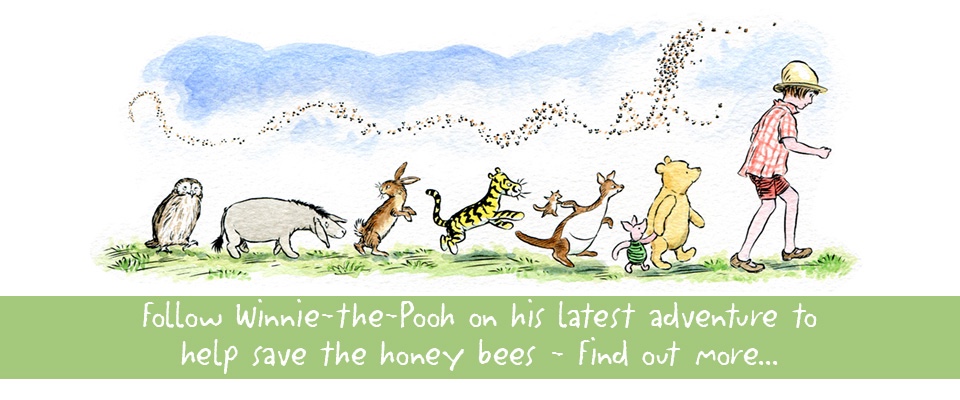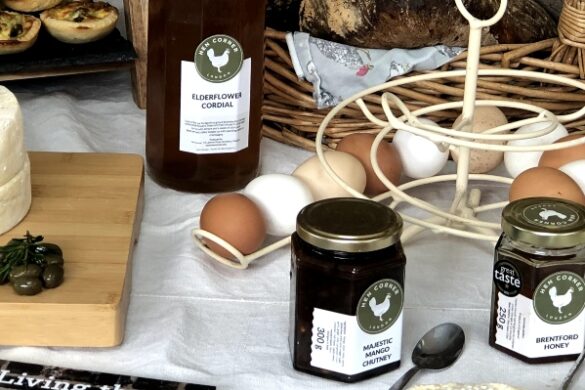‘But if there aren’t lots of bees then there won’t be any honey.’ *
*Winnie the Pooh
Honey bees have been in the news a lot recently and, unfortunately, not always for good reasons. Our beautiful little honey bees, often confused with wasps due to their petite frame, are often ignored when they are gently flitting from flower to flower foraging for nectar and pollen to take back to the hive. But when pollination of crops is low, remember the apple shortage of 2012, or when they swarm in a public place, be that on Top Shop in Central London or onto a pizza delivery bike, the blame rests on them for our little inconveniences. Personally, our apples did rather well in 2012, as I watched the bees risk the short flight from bee hive to blossom dodging the rain drops, we still managed to make 32 pints of cider and I’m sure that blossom helped us scoop First Prize for our London Honey!
As for swarms, I appreciate that to the uneducated, they can be rather scary. I clearly remember the first swarm that I witnessed from inside the conservatory during my first year of bee keeping. It was like something from an Indiana Jones movie… Once we understand that honey bees are often swarming due to their very good health and desire to reproduce, that they usually only sting to defend either brood or food, of which they have neither babies nor honey with them when they swarm, and that they are so focussed on finding a new home for their beloved queen that they have no interest in you at all, then we can feel a bit more confident in taking a deep breath and enjoying the moment to marvel at this amazing act of nature.
‘But I don’t really like honey…’ I hear you cry, and if that opinion is founded on tasting cheap blended honey gathered from no particular place and packaged for the supermarkets, then I don’t blame you. As for the honey flavoured cough sweets, medicine and breakfast cereals – well I could happily live without those, however, our dependence on the honey bee is so much more than to ensure we can have the occasional spoon of brown gloop. Green peace tells us that 70 out of the top 100 human food crops, which supply about 90 percent of the world’s nutrition, are pollinated by bees.
Think of your favourite meal, mmm, lasagna, salad and a glass of wine. Sorry, try making lasagna without tomatoes & onion, the salad would be pretty bare, and as for the wine – that’s a no go as bees need to pollinate the grape flowers before they fruit. Maybe I’ll have a pear and almond tart with a cup of coffee? Nope, no pears, almonds or coffee. What if I gave you the shirt off my back? Unfortunately, if it’s made of cotton then we are relying on the bees to pollinate that crop as well, a longer list of examples can be found here.
So why do the bees suddenly need saving? What do they need saving from? Sadly, a lot of the problem is our greed as humans. Intensive farming, prioritising economics over environment, is causing many farmers to plant the most valuable crop on every inch of available land, this results in an abundant food supply for the bees during the 2-3 weeks that the crop is flowering but hardly anything else either side of that window. Organic farming encourages farmers to leave margins of hedgerow and wildflowers around their fields which helps maintain sources of food for our pollinators and wildlife throughout the year. Organic farming also restricts the use of chemicals and pesticides that could have unknown effects on our little bees. These are just a couple of reasons why our urban bees seem to be thriving better than their rural cousins as the parks, back gardens and allotments of our towns and cities often have a fabulous diversity of flowering plants available to bees throughout the year.
You may have heard of Colony Collapse Disorder, from the bee keepers that I know, this doesn’t seem to be a big problem here in the UK, but if we followed the practises of other nations that regularly stack hundreds of hives on the back of a huge truck to transport them across the nation for pollination favours, often on crops contaminated with pesticides, then we may discover disoriented, stressed bees that fail to thrive in their working conditions. Another challenge for our bees, caused by our greed, is if we fail to ensure that they have enough food stores left in the hive throughout winter, especially if we have harvested most of their stored honey for ourselves. Add negligent disease management to the list and the poor bees are really rather vulnerable.
So, as a mother, food lover and bee keeper, I was delighted to see this wonderful new campaign, commissioned by Friends of the Honey Bee, part of the British Bee Keeping Association, who aim to build a better future for Britain’s honey bees and other pollinators by planting more pollen-rich environments, encouraging others to plant for the honey bees and funding research into the varroa mite and honey bee health.
If you haven’t guessed, they have partnered with the world’s most famous honey lover, Winnie the Pooh, to encourage us all to do our bit to help save the honey bees.
The 10 top tips start with how to plant a window box that provides food for bees and ends with what to do if you see a swarm…
There’s always so much more to learn about bees and if you’d like to spend the day at Hen Corner discovering more about ours, we’d love you to join us on one of our courses, more info here. We always finish our time with a honey tasting and you can sample both urban and rural honey from around the country, including a taste from that winning jar saved from 2012!
It would be a pleasure to welcome you to one of our courses that we have running right throughout the year. The next couple of weeks brings Full Day Bee Keeping, Urban Hens – Keeping Chickens in London and Scones and Jam.
As we enter the school summer holidays, we have a wide range of family courses all aimed at helping us understand more of where our food comes from.
Alternatively, if you are interested in a private event for you and your friends, or a team meeting for your work colleagues. Do contact us for more information.
Other News:
- After 4 hours of hard work, I created a net cage and covered our almond tree which is usually robbed by cheeky squirrels. Our bees have pollinated each nut and growing our own reduces our dependence on the Californian nuts relying on truckloads of transported bees
- We’ve put another row of supers on the bee hive – this is where they store the honey for us
- Our kitchen has finally been finished!!!! This has been a long process, but we are very pleased with the end result.
Jobs for this week:
- Check on the bees at Kew Gardens, each colony should have a new queen by now
- Contact local schools to book in sessions for September
- Prepare an order of home-grown food for a pop up restaurant that loves to serve local produce
Join us on the Journey!








